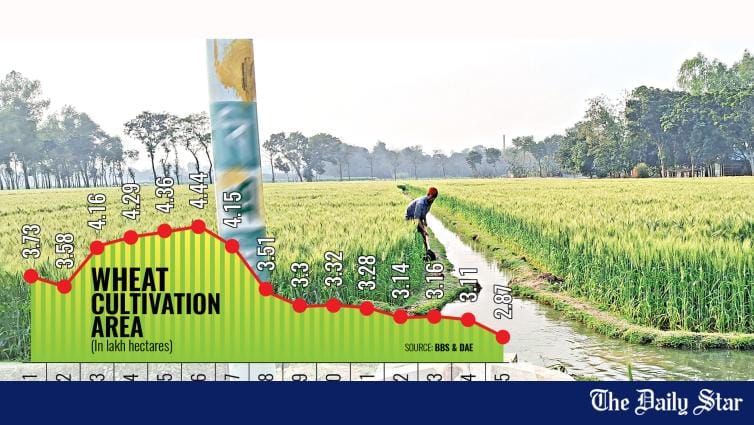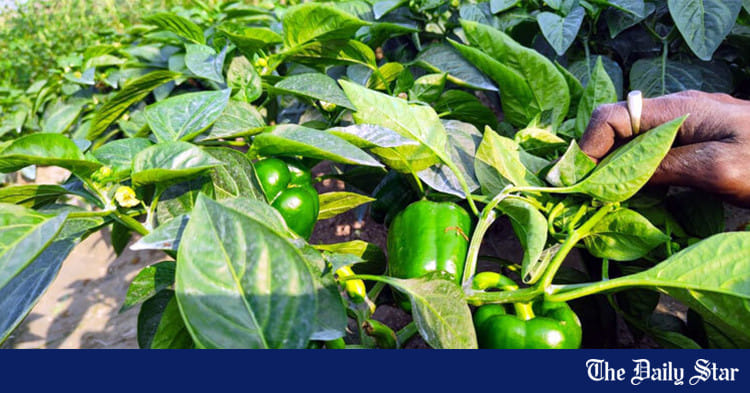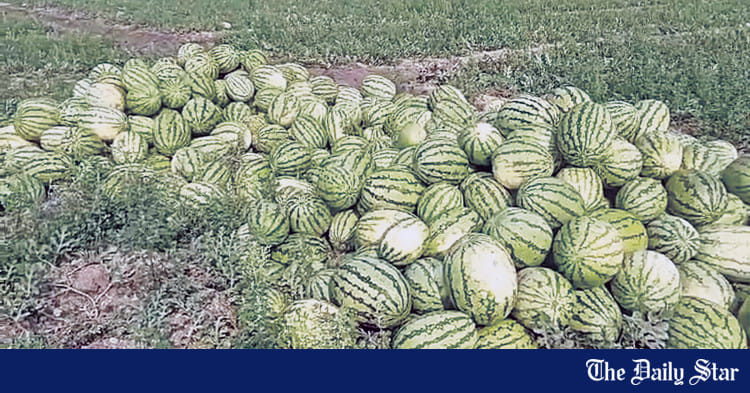Saif
Senior Member
- Joined
- Jan 24, 2024
- Messages
- 17,300
- Likes
- 8,340
- Nation

- Residence

- Axis Group


Farmers forced to pay more than subsidised rates for fertiliser
Farmers in different parts of the country are being compelled to buy fertiliser, a key ingredient for crop production, by paying more than government-fixed prices.
Farmers forced to pay more than subsidised rates for fertiliser

As transplantation of Boro season paddy is running in full swing, farmers across the country are being forced to pay over the odds for fertiliser as retailers cite a lack of supply. The higher prices of the key production input, alongside rising costs of pesticides and labour, are putting a strain on small growers. Photo: Kongkon Karmaker
Farmers in different parts of the country are being compelled to buy fertiliser, a key ingredient for crop production, by paying more than government-fixed prices.
This has posed a significant setback for farmers during the current Boro season, the biggest in terms of rice production volume.
Growers are being charged Tk 3 to Tk 4 more than the set prices for each kilogramme (kg) of chemical fertiliser, including urea, Triple Super Phosphate (TSP), Diammonium Phosphate (DAP), and Muriate of Potash (MOP), as dealers complain of supply shortages.
Take the case of Ajay Das and Liton Das, two small farmers from the Badhal union of Bagerhat.
They purchased urea fertiliser at Tk 30 per kg and TSP at Tk 35 per kg nearly three weeks ago, paying far more than the administered rates, which are Tk 27 per kg for both products.

Photo: Titu Das
Besides, they are supposed to get each kg of DAP for Tk 21 and MOP for Tk 20.
The subsidies are aimed at keeping production costs low, facilitating food production, safeguarding the nation's food security, and enabling consumers to afford food regardless of their income level.
But now, higher prices of key production inputs are putting a strain on businesses.
"It is increasingly difficult for small farmers like us to sustain the business among rising production costs," lamented Ajay, one of tens of thousands of growers who have seen their costs of production rise steadily over the years.
For example, labour costs with food stood at Tk 544 in June 2024, up from Tk 511 in July of the previous year, according to the Bangladesh Bureau of Statistics (BBS).
In 2023, the previous Awami League government hiked prices of urea, DAP, TSP, and MOP fertilisers by Tk 5 per kg, less than a year after it raised the administered rates by Tk 6 per kg.
For the current fiscal year, the government projects a total of 59 lakh tonnes of urea, TSP, DAP, and MOP will be required, up 3 percent from a year ago.
Chemical fertilisers are mainly used to grow dry-season rice, locally named Boro, which is harvested in May.
Of all the fertiliser that is required to grow Boro season paddy, farmers apply roughly 60 percent in the four months from December to March, a senior official of the agriculture ministry said.
However, many farmers are not getting fertiliser as required.
For instance, Md Mozibar Rahman, a farmer from Mistripara village in Dinajpur who is cultivating a six-bigha Boro field, could not purchase fertiliser from a dealer in his area as his stock had been sold out.
He had to turn to a retailer, paying Tk 1,550 for a 50-kg (Tk 31 per kg) bag of TSP and Tk 1,200 for 50 kg of DAP (Tk 24 per kg).
"The seller refused to provide a receipt against the purchase," Mozibar alleged, adding, "Farmers like us are struggling due to the high input costs of fertilisers, pesticides, and labour, while we continue to be denied fair prices for our crops."
Shariful Islam, a fellow grower who lives in Gobindapur village of the Biral upazila in the same district, shared a similar experience.
He said fertiliser prices usually spike during periods of high demand and limited supply.
"I recently paid Tk 3,500 for two bags of TSP, although the official price is Tk 2,700," he said.
He added that dealers in his area do not generally overcharge, but alleged that retailers charge more than set prices.
"We are compelled to buy fertiliser at higher rates as there is no alternative. The dealers often cite transportation costs or low availability as reasons for price hikes," said Gouranga Das, another farmer in Bagerhat.
However, Md Nazrul Islam, a fertiliser dealer in Pabna, said they are selling fertiliser to retailers in line with government prices. He alleged that retailers may be increasing prices a little bit to make some profit.
Although insiders said there is a shortage of DAP, the deputy directors of the Department of Agricultural Extension (DAE) in Dinajpur and Pabna denied that there is any fertiliser shortage.
"We are getting supplies from the Bangladesh Agricultural Development Corporation (BADC) as required. We are waiting," an official of the Bangladesh Fertilizer Association (BFA) said.
Md Jamal Uddin, the deputy director of the DAE in Pabna, said there is no scope for a fertiliser crisis during the Boro season.
Asked about the hike in fertiliser prices at the retail level, he said his office and local administration are continuing drives to keep the market under control during the peak of the cultivation season.
Farmers are accustomed to buying the entire stock of fertiliser for the Boro season when they start cultivation, which causes trouble later.
Contacted, Md Aminul Islam, the deputy director of the DAE's Dhaka office who is in charge of fertiliser management, said prices are not supposed to be higher than the rate fixed by the government. "We get such allegations occasionally and take action," he said.
The BFA official added that one of the reasons farmers are forced to pay more than administered rates is the low commission for dealers and transport costs.
"Dealers get only Tk 2 as commission plus transport costs. The commission was fixed in 2008 and has not been hiked even though we have repeatedly requested the government to do so."
Agriculture Secretary Mohammad Emdad Ullah Mian could not be reached for comment over the phone despite repeated efforts. BADC Chairman Md Ruhul Amin Khan could not be reached for comment either.
As transplantation of Boro season paddy is running in full swing, farmers across the country are being forced to pay over the odds for fertiliser as retailers cite a lack of supply. The higher prices of the key production input, alongside rising costs of pesticides and labour, are putting a strain on small growers. Photo: Kongkon Karmaker
Farmers in different parts of the country are being compelled to buy fertiliser, a key ingredient for crop production, by paying more than government-fixed prices.
This has posed a significant setback for farmers during the current Boro season, the biggest in terms of rice production volume.
Growers are being charged Tk 3 to Tk 4 more than the set prices for each kilogramme (kg) of chemical fertiliser, including urea, Triple Super Phosphate (TSP), Diammonium Phosphate (DAP), and Muriate of Potash (MOP), as dealers complain of supply shortages.
Take the case of Ajay Das and Liton Das, two small farmers from the Badhal union of Bagerhat.
They purchased urea fertiliser at Tk 30 per kg and TSP at Tk 35 per kg nearly three weeks ago, paying far more than the administered rates, which are Tk 27 per kg for both products.
Photo: Titu Das
Besides, they are supposed to get each kg of DAP for Tk 21 and MOP for Tk 20.
The subsidies are aimed at keeping production costs low, facilitating food production, safeguarding the nation's food security, and enabling consumers to afford food regardless of their income level.
But now, higher prices of key production inputs are putting a strain on businesses.
"It is increasingly difficult for small farmers like us to sustain the business among rising production costs," lamented Ajay, one of tens of thousands of growers who have seen their costs of production rise steadily over the years.
For example, labour costs with food stood at Tk 544 in June 2024, up from Tk 511 in July of the previous year, according to the Bangladesh Bureau of Statistics (BBS).
In 2023, the previous Awami League government hiked prices of urea, DAP, TSP, and MOP fertilisers by Tk 5 per kg, less than a year after it raised the administered rates by Tk 6 per kg.
For the current fiscal year, the government projects a total of 59 lakh tonnes of urea, TSP, DAP, and MOP will be required, up 3 percent from a year ago.
Chemical fertilisers are mainly used to grow dry-season rice, locally named Boro, which is harvested in May.
Of all the fertiliser that is required to grow Boro season paddy, farmers apply roughly 60 percent in the four months from December to March, a senior official of the agriculture ministry said.
However, many farmers are not getting fertiliser as required.
For instance, Md Mozibar Rahman, a farmer from Mistripara village in Dinajpur who is cultivating a six-bigha Boro field, could not purchase fertiliser from a dealer in his area as his stock had been sold out.
He had to turn to a retailer, paying Tk 1,550 for a 50-kg (Tk 31 per kg) bag of TSP and Tk 1,200 for 50 kg of DAP (Tk 24 per kg).
"The seller refused to provide a receipt against the purchase," Mozibar alleged, adding, "Farmers like us are struggling due to the high input costs of fertilisers, pesticides, and labour, while we continue to be denied fair prices for our crops."
Shariful Islam, a fellow grower who lives in Gobindapur village of the Biral upazila in the same district, shared a similar experience.
He said fertiliser prices usually spike during periods of high demand and limited supply.
"I recently paid Tk 3,500 for two bags of TSP, although the official price is Tk 2,700," he said.
He added that dealers in his area do not generally overcharge, but alleged that retailers charge more than set prices.
"We are compelled to buy fertiliser at higher rates as there is no alternative. The dealers often cite transportation costs or low availability as reasons for price hikes," said Gouranga Das, another farmer in Bagerhat.
However, Md Nazrul Islam, a fertiliser dealer in Pabna, said they are selling fertiliser to retailers in line with government prices. He alleged that retailers may be increasing prices a little bit to make some profit.
Although insiders said there is a shortage of DAP, the deputy directors of the Department of Agricultural Extension (DAE) in Dinajpur and Pabna denied that there is any fertiliser shortage.
"We are getting supplies from the Bangladesh Agricultural Development Corporation (BADC) as required. We are waiting," an official of the Bangladesh Fertilizer Association (BFA) said.
Md Jamal Uddin, the deputy director of the DAE in Pabna, said there is no scope for a fertiliser crisis during the Boro season.
Asked about the hike in fertiliser prices at the retail level, he said his office and local administration are continuing drives to keep the market under control during the peak of the cultivation season.
Farmers are accustomed to buying the entire stock of fertiliser for the Boro season when they start cultivation, which causes trouble later.
Contacted, Md Aminul Islam, the deputy director of the DAE's Dhaka office who is in charge of fertiliser management, said prices are not supposed to be higher than the rate fixed by the government. "We get such allegations occasionally and take action," he said.
The BFA official added that one of the reasons farmers are forced to pay more than administered rates is the low commission for dealers and transport costs.
"Dealers get only Tk 2 as commission plus transport costs. The commission was fixed in 2008 and has not been hiked even though we have repeatedly requested the government to do so."
Agriculture Secretary Mohammad Emdad Ullah Mian could not be reached for comment over the phone despite repeated efforts. BADC Chairman Md Ruhul Amin Khan could not be reached for comment either.









































